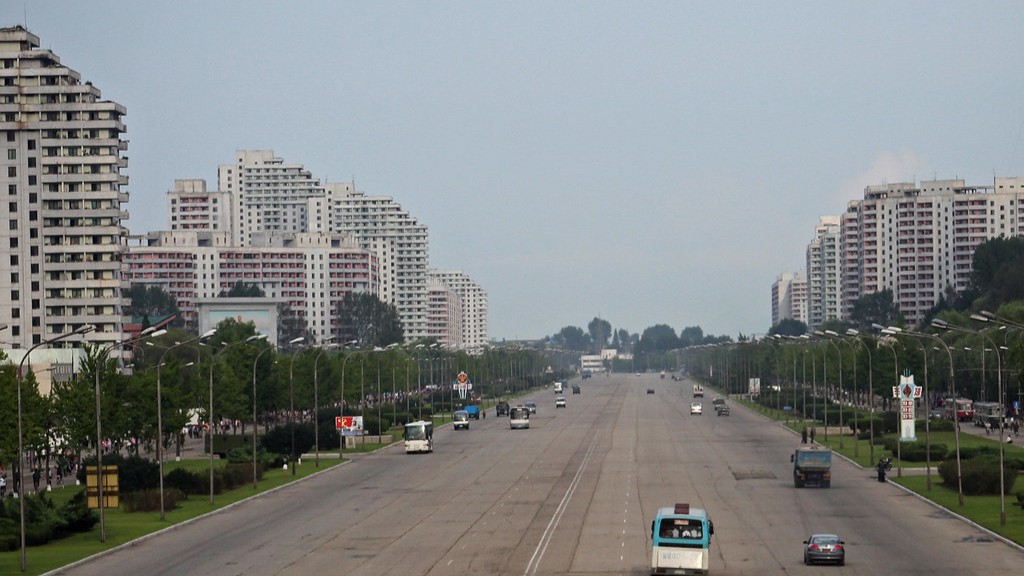Underlying Reasons of Antagonism Towards the US
The United States and North Korea have been enemies since the Korean War in the 1950s, when the two were on opposite sides of the divide. North Korea’s hatred for the US, however, has been intensifying in recent years and analysts are looking for answers as to why. To begin with, the US’ economic and military strength combined with its allies in the region serves as a constant reminder to North Korea of its own shortcomings. North Korea looks upon the US as a threat to their own ambitions, as their aspirations for power and influence cannot match those of their neighbours. This creates a deep-seated feeling of betrayal and mistrust towards the US, which is at the heart of North Korea’s anger.
Second, North Korea’s authoritarian government has been hostile towards the liberal values associated with the US and its allies in Europe and elsewhere. The North Korea government has long sought to promote a highly conservative and militaristic mindset amongst its people, while actively shunning democracy and the values and laws of the international community. This is seen as an affront to the American ideal of freedom and democracy, which further exacerbates the tensions between the US and North Korea.
Finally, North Korea’s feeling of insecurity is upscaled by the perceived antagonism of the US. With the recent implementation of stronger economic sanctions, North Korea has accused the US of using the sanctions as a tool to repress its citizens and weaken the economy. It has also accused the US of refusing to talk to them and instead looking to form military alliances in an attempt to encircle and strangulate North Korea.
North Korea’s Foreign Policy
North Korea has adopted an openly hostile stance towards the United States, including recalling its ambassadors to the US and suspending its diplomatic ties. North Korea’s foreign policy towards the US further manifests itself in the form of war-mongering rhetoric, such as their nuclear weapons trials and associated threats. This serves as a way for North Korea to compromise US-led international efforts to end the contested nuclear crisis on the Korean Peninsula and to demonstrate their geopolitical clout.
In addition, North Korea’s leadership has promoted the use of propaganda to further taint the US’ reputation. Through a variety of tactics, including radio, print and digital media, as well as through art, posters and songs, North Korea has sought to enhance its anti-American image and to cause anxiety amongst its populace towards the US. This type of propaganda portrays the US as a “big brother” figure who is constantly watching its citizens and manipulating their views and opinions.
North Korea also views the US with mistrust and suspicion when it comes to the debates surrounding human rights issues. North Korea has been hostile towards US-led efforts at the United Nations to investigate and address its alleged violations of international human rights law and of its citizens’ rights. North Korea also objects to the US’ implementation of unilateral sanctions as a means of applying pressure on the country to change its policies and undertakings.
North America’s Response
The United States has sought to reach out to North Korea and to engage in a meaningful and lasting dialogue. However, in recent years negotiations have failed, often due to North Korea’s reluctance or intransigence in engaging with the US. This has resulted in an impasse, as both sides have yet to reach a consensus on how to move forward and resolve their differences.
The US has also expressed concerns over the North Korea’s nuclear ambitions and the potential threat they pose to regional and global security. As a response, the US has called for an international coalition of countries to impose economic sanctions and curb North Korea’s nuclear ambitions. The US and its allies have also increased their military presence in the region, further raising tensions.
The US has also implemented other measures to contain North Korea’s expanding nuclear capabilities and influence. The US has pushed for the closure of foreign banks that aid or facilitate North Korea’s money laundering activities and sanctions, as well as for greater diplomatic and economic cooperation with other allies in the region.
North Korea’s Bank Accounts & Sanctions
North Korea has long operated various accounts in foreign banks to anonymise and manage its financial operations. It is speculated that the funds from these activities are used to finance its operations, including its nuclear weapons programs and military activities. In an effort to curb North Korea’s nuclear ambitions, the United States has undertaken a strict policy of imposing sanctions against both North Korea and its financial institutions.
These sanctions have targeted North Korea’s economy and put an immense amount of economic pressure on the county, resulting in a great amount of suffering amongst its citizens. North Korea, in response, has threatened to launch nuclear strikes against the United States and its allies if the sanctions are not removed. This has further escalated tensions between the two countries, as the US refuses to back down and North Korea continues to resist international pressure.
Recent Diplomatic Engagement
Relations between the US and North Korea have begun to improve in recent years, with both countries engaging in various diplomatic talks. In 2018, US President Donald Trump and North Korean leader Kim Jong Un held a historic summit in Singapore, which marked a major turning point in their relations. During the summit, both leaders made a verbal commitment to denuclearise the Korean Peninsula, however soon after negotiations stalled and little progress has been made since.
In 2019, the two leaders held another summit in Hanoi, in the hopes that they could iron out the details of their denuclearisation agreement. Ultimately, the discussions stalled once again, as both sides failed to come to an agreement. While the US had offered several incentives, North Korea maintained that it would only accept the lifting of all sanctions in exchange for its denuclearisation.
North Korea’s Intervention in South
The relations between North and South Korea have been strained for decades, with recent events having only exacerbated the situation. In 2018, North Korea tested a new long-range intercontinental ballistic missile capable of reaching the US mainland, resulting in condemnation from the US and its allies in South Korea. As tensions around the world continued to heighten, North Korea also began to ramp up its military-related activities in South Korea. North Korea conducted cyber-attacks and military drills along the border, as well as alleged assassination attempts against leaders in the South.
The US responded by calling for international condemnation of North Korea’s attacks on South Korea and for the implementation of stronger sanctions. North Korea, however, has continually denied any involvement and insists that its activities in the South are defensive in nature. This has only further heightened tensions between the two countries and further escalated the risk of conflict in the region.
North Korea’s Human Rights Record
North Korea’s human rights record has long been a source of consternation and conflict between them and the United States. North Korea’s treatment of its citizens and political opponents has been widely condemned by the US and other members of the international community. For many years, the US has sought to shine a light on North Korea’s human rights abuses and has been pushing for change.
In 2017, the US imposed new sanctions on North Korea in an effort to pressure the country to stop its human rights violations. The sanctions targeted North Korea’s leadership, as well as several key officials and entities, including the state security agency, which has been accused of using torture and other methods of abuse against citizens.
Decline in North Korea-US Relations
Despite some progress in their diplomatic talks, relations between the US and North Korea have largely declined in recent years. This can be attributed to a variety of factors, including North Korea’s refusal to abandon its nuclear weapons and ballistic missile programs, and its provocative military activities in the region. In addition, North Korea’s continued human rights abuses, its war-mongering rhetoric, and its insistence on clashing with the US’ liberal values have all served to strain the two countries’ relations.
Despite their differences, US and North Korean officials have continued their dialogue and efforts to reach a peaceful resolution. However, this goal has yet to be achieved, as both sides remain at an impasse on the best way to proceed. It remains to be seen how the US and North Korea will handle the current diplomatic impasse, and whether the two countries can eventually reach common ground.


